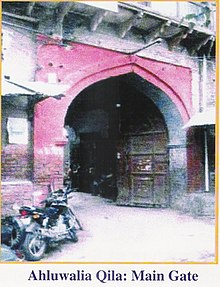Ahluwalia (misl)

Ahluwalia (also transliterated as Ahluvalia) was a misl, that is, a sovereign state in the Sikh Confederacy of Punjab region in present-day India and Pakistan. The misl's name is derived from Ahlu, the ancestral village of the misl leaders. The Ahluwalia misl was one of the 12 major Sikh misls, and held land to the north of Sutlej river.[1]
| Misls of the Sikh Confederacy |
|---|
 |
History
Different scholars variously name the misl's founder as Sadho Singh,[2][3] his descendant Bagh Singh,[4][5] or Bagh Singh's nephew Jassa Singh Ahluwalia.[6][7]
The misl rose to prominence under Jassa Singh,[1][8] who was the first person to use the name "Ahluwalia". Originally known as Jassa Singh Kalal, he styled himself as Ahluwalia after his ancestral village of Ahlu.[9]
Even after other misls lost their territories to Ranjit Singh's Sikh Empire, the emperor permitted the descendants of Jassa Singh to retain their estates. After the British took over the Sikh territories in 1846, Jassa Singh's descendants became the ruling family of the Kapurthala State.[10]
Dynasty
Sardars
- Jassa Singh (1777 – 20 October 1783)[11] (b. 1718 – d. 1783)[12]
- Bhag Singh Ahluwalia (20 October 1783 – 10 July 1801) (b. 1747 – d. 1801)[citation needed]
Rajas
- Fateh Singh Ahluwalia (10 July 1801 – 20 October 1837) (b. 1784 – d. 1837)[13][14][15]
- Nihal Singh (20 October 1837 – 13 September 1852) (b. 1817 – d. 1852)
- Randhir Singh (13 September 1852 – 12 March 1861) (b. 1831 – d. 1870)[12]
Raja-i Rajgan
- Randhir Singh (12 March 1861 – 2 April 1870) (b. 1831 – d. 1870)
- Kharak Singh (2 April 1870 – 3 September 1877) (b. 1850 – d. 1877)
- Jagatjit Singh (3 September 1877 – 12 December 1911) (b. 1872 – d. 1949)[12]
Maharajas
- Jagatjit Singh (12 December 1911 – 15 August 1947) (b. 1872 – d. 1949)[12]
- Paramjit Singh (b. 1892 - d. 1955)
- Brigadier Sukhjit Singh MVC(b. 1934)
Crown Prince
- Tikka Raja Shatrujit Singh (b. 1961)[16]
Gallery
- Equestrian painting of Jassa Singh Ahluwalia, Punjab Plains, circa 1850
- Miniature painting of Bhag Singh Ahluwalia, ca.1785
- Painting of Raja Fateh Singh Ahluwalia
- Raja Fateh Singh Ahluwalia, CIE
- Photograph of Jassa Singh Ahluwalia's haveli
References
- ^ a b Kaushik Roy (2015). Military Manpower, Armies and Warfare in South Asia. Routledge. p. 88. ISBN 9781317321279.
- ^ G. S. Chhabra (1972). Advanced History of the Punjab: Ranjit Singh & post Ranjit Singh period. New Academic. p. 21.
Its founder was one Sadhu Singh, a jat of the Kalal or distiller caste. But the true founder of the confederacy was Jussa Singh...
- ^ Surjit Singh Gandhi (1999). Sikhs in the Eighteenth Century: Their Struggle for Survival and Supremacy. Singh Bros. p. 393. ISBN 978-81-7205-217-1.
The Misl was founded by Sadda Singh who was Jat by race and Kalal (wine distiller) by profession and lived seven miles east of Lahore in a village named Ahlu which gave its name to the Misl
- ^ Gurbachan Singh Nayyar (1979). Sikh Polity and Political Institutions. Oriental. p. 120.
The founder of Ahluwalia misl was Bagh Singh.
- ^ Khazan Singh (1970). History of the Sikh religion. Department of Languages, Punjab. p. 289.
The real founder of the misl was Sardar Bagh Singh, Kalal, of Hallo-Sadho. He was initiated with pahaul by Bhai Mani Singh in Sambat in 1771 (1714 A D ) and soon after that became leader of a considerable body of troops.
- ^ Jagjiwan Mohan Walia (1982). Parties and politics at the Sikh court, 1799-1849. Master. p. 6.
The Ahluwalia Misl was founded by Jassa Singh, who belonged to village Ahlu.
- ^ Harish Jain (2003). The Making of Punjab. Unistar. p. 201.
Ahluwalia Misl - This was founded by Jassa Singh Ahluwalia and was named after his village Ahlu.
- ^ Singhia, H.S. (2009). The encyclopedia of Sikhism. New Delhi: Hemkunt Press. p. 111. ISBN 978-81-7010-301-1.
- ^ Donald Anthony Low (1968). Soundings in Modern South Asian History. University of California Press. p. 70-71. OCLC 612533097.
- ^ W. H. McLeod (2009). The A to Z of Sikhism. Scarecrow Press. p. 6. ISBN 978-0-8108-6344-6.
- ^ "Kapurthala". Archived from the original on 2018-08-08. Retrieved 2021-01-05.
- ^ a b c d "KAPURTHALA". Royal Family of India. 2013-04-12. Retrieved 2018-01-09.
- ^ "History | Kapurthala Web Portal | India". Government of India. Retrieved 25 December 2020.
- ^ A history of the Sikhs, from the origin of the nation to the battles of the Sutlej. Cunningham, Joseph Davey, 1812-1851., Garrett, H. L. O. ed. (Herbert Leonard Offley), 1881-1941
- ^ Griffin, Lepel Henry (1892). Ranjit Singh. Oxford : Clarendon press.
- ^ "An undivided India?". NDTV. 29 August 2009. Retrieved 19 October 2020.





